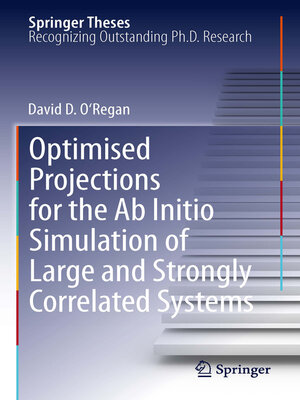Optimised Projections for the Ab Initio Simulation of Large and Strongly Correlated Systems
ebook ∣ Springer Theses
By David D. O'Regan

Sign up to save your library
With an OverDrive account, you can save your favorite libraries for at-a-glance information about availability. Find out more about OverDrive accounts.
Find this title in Libby, the library reading app by OverDrive.



Search for a digital library with this title
Title found at these libraries:
| Library Name | Distance |
|---|---|
| Loading... |
Density functional theory (DFT) has become the standard workhorse for quantum mechanical simulations as it offers a good compromise between accuracy and computational cost.
However, there are many important systems for which DFT performs very poorly, most notably strongly-correlated materials, resulting in a significant recent growth in interest in 'beyond DFT' methods. The widely used DFT+U technique, in particular, involves the addition of explicit Coulomb repulsion terms to reproduce the physics of spatially-localised electronic subspaces.
The magnitude of these corrective terms, measured by the famous Hubbard U parameter, has received much attention but less so for the projections used to delineate these subspaces.
The dependence on the choice of these projections is studied in detail here and a method to overcome this ambiguity in DFT+U, by self-consistently determining the projections, is introduced.
The author shows how nonorthogonal representations for electronic states may be used to construct these projections and, furthermore, how DFT+U may be implemented with a linearly increasing cost with respect to system size.
The use of nonorthogonal functions in the context of electronic structure calculations is extensively discussed and clarified, with new interpretations and results, and, on this topic, this work may serve as a reference for future workers in the field.







